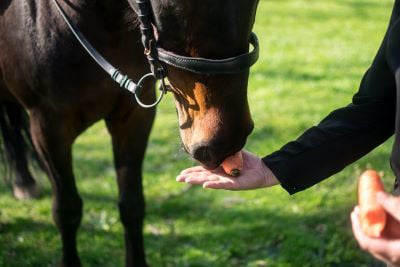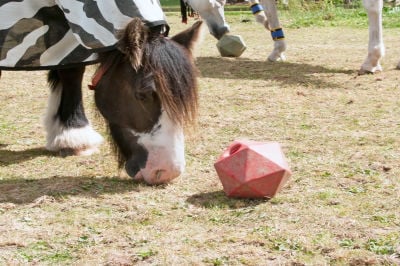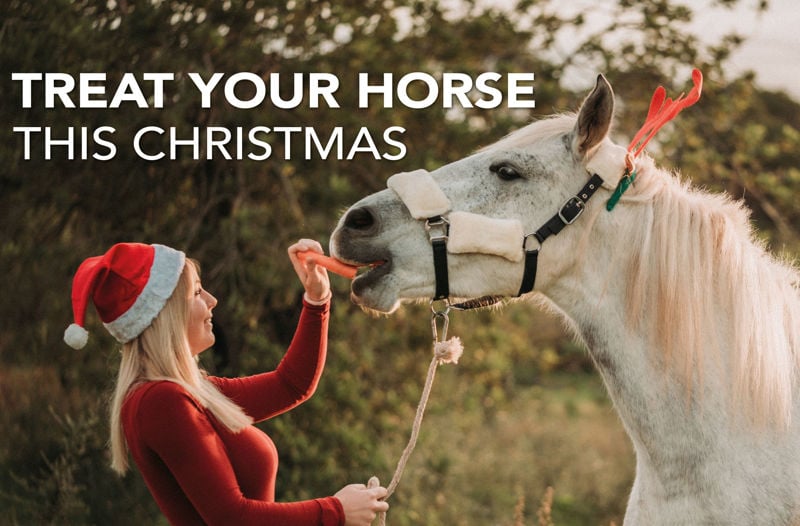During the festive period, everyone likes to indulge in a little treat, and our horses deserve a reward too! While fruit and vegetables make excellent snacks for our four legged friends, it's crucial to choose wisely, particularly if you horse suffers from Laminitis, Equine Metabolic Syndrome (EMS) and/or obesity. Discover which healthy, low-sugar options are safe and which treats are best to avoid to keep your horse, pony (or donkey) happy and healthy this Christmas.
When should you give your horse treats?
Treats are a great way to reward your horse for their hard work, or simply to show your appreciation for your furry friend! The right treat at the right time can reinforce positive behaviour and help build trust. Remeber, treats are supposed to be an occasional addition to the diet, just like they are for us, so always feed in moderation. Horses with metabolic issues can still enjoy the occasional treat as long as it is only given on occasion and is an appropriate treat for their dietary requirements.

What is a good natural treat for a horse?
Providing certain fresh fruit and vegetable treats can be a great option. Here are some of our favourites:
Apples:
Apples contain nutritional benefits including vitamin A & C. These vitamins will support the immune system and recovery. Alongside having dietary fiber which helps aid digestion and gut health. However, the natural sugars in apples can be high meaning over feeding can be dangerous. Having apples occasionally after exercising for a quick energy source is a good way of minimizing the risk of having high sugar levels in your horse.
Banana's:
Many horses have shown to enjoy eating a banana, even with the skin on, as a well-deserved treat. Bananas are also known to be very high in potassium, which is an added bonus!
Celery:
Another treat/snack which is low in natural sugar making it suitable for all, is celery. Celery is naturally high in cellulose which can make the horse chew more, consequently leading to more alkaline saliva being produced which can potentially help to soothe the mucosal lining of the gut.
Carrots:
While carrots have a high sugar content, the fact that they are 80% water absolves them from guilt! Fresh carrots actually have fewer calories and more fibre than apples. So if you want to give your horse a reward or tempt him to eat, carry on slicing.
Swedes:
Swedes are a great alternative for white potatoes but they don’t contain as many carbohydrates that break down into simple sugars. They also are high in fibre whilst staying low in calories.
Turnips:
Glucosinolates that are found in turnips help reduce inflammatory. Glucosinolates form the amino acids which are beneficial for horses as a balanced range of amino acids support muscle, metabolic, immune and digestive health.
Top tip:
When feeding vegetables it is important to always remember to cut up them lengthways to reduce the risk of choke!
A treat ball or a good boredom buster can also be great ideas. For example, you can hang fruit and vegetables on a piece of string tied securely in your horse’s stable. This can give your horse stimulation and is also a nice treat.

A treat ball or a good boredom buster can be great ideas.
Things to be aware of when treating your horse
Some treats may not be suitable for all horses due to the possible high sugar content. Common favourites such as apples are very popular with most horses, but the sugar levels within them are considerably higher than that of celery, swedes, turnips and other options.
High levels of sugar can disrupt hindgut fermentation; as the horse becomes unable to digest the sugars, they flood into the hindgut, disrupt the environment and reduce the efficiency of fibre fermentation as well as producing acidic molecules called endotoxins. If your horse or pony suffers from Laminitis, Equine Metabolic Syndrome (EMS) and/or obesity we would recommend staying clear of treats with high levels of sugar.
It's also important to remember to be careful when feeding your horse left over Christmas vegetables. Whilst many vegetables are great for horses, such as carrots, parsnips and swedes, some vegetables should not be fed. Brussels sprouts, cabbage, onions and white potatoes should never be fed to horses.
Here's some more detail on the treats we don't recommend feeding to your horse:
Brussel Sprouts and cabbage:
Vegetables such as Brussel sprouts belong to the brassica family. This means these vegetables can lead to unwanted digestive discomfort. Other digestion problems include bloating. Brussel sprouts are rich in vitamins and minerals however there are many alternatives that are much safer alternative to avoid gas problems.
Onions:
Onions contain a high level of thiosulphate which can cause damage to red blood cells. This is not ideal for circulation round the horse’s body.
White potatoes:
White potatoes contain a compound called atropine, which can affect the nervous system and is on the NOPS list. They are also high in starch which is not ideal for the digestive system. So, we don't advise feeding your horse any of your left over roast potatoes!
Alternative treats for veteran horses at Christmas:
If any of your older horses struggle to have a treat around Christmas due to dental health. Any leftovers that fall into the good treat list can be put into a stew to soften the vegetables. Once cold your older horses can enjoy eating some soften vegetables.
If you have any queries about your horse’s diet or on what treats to give them, please contact our Nutritionists who are more than happy to help. Just call freephone 0800 585525 or email [email protected].


